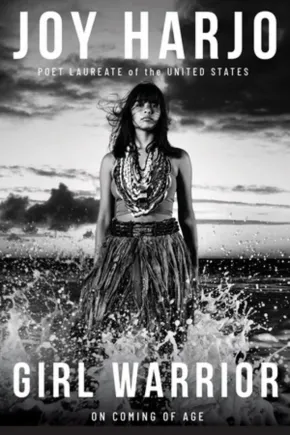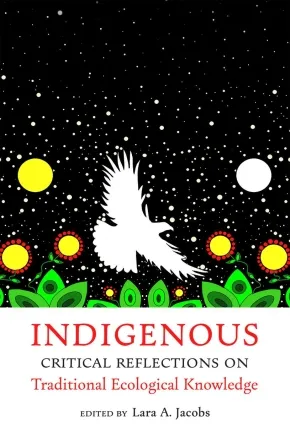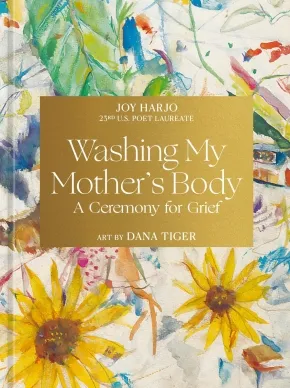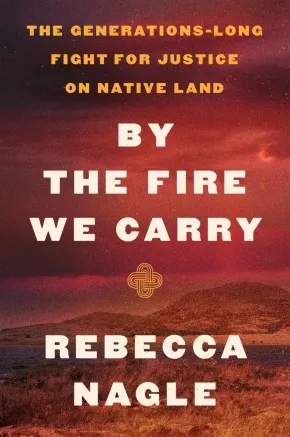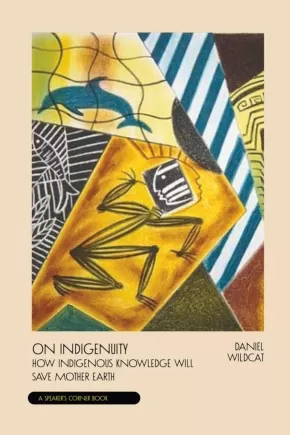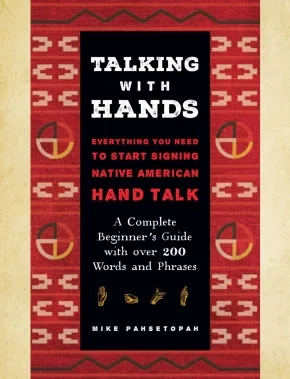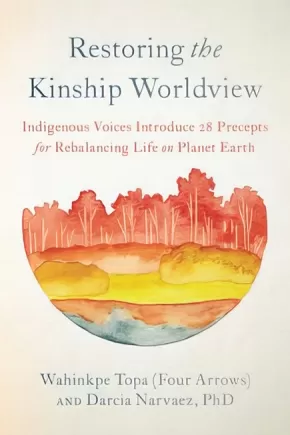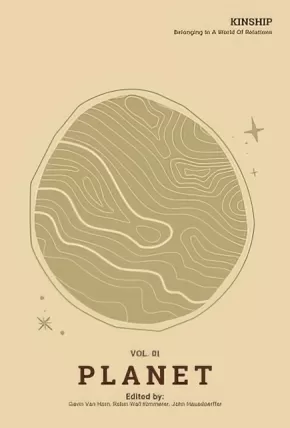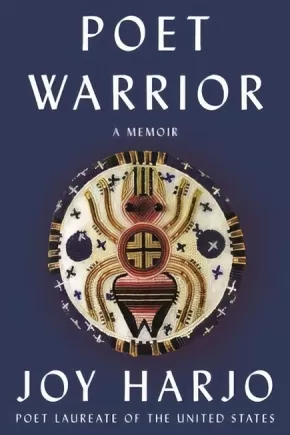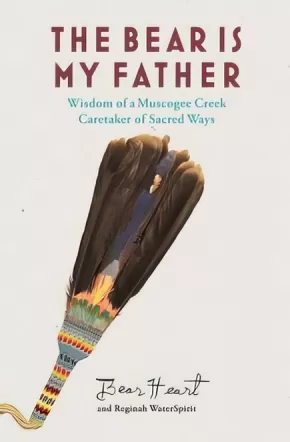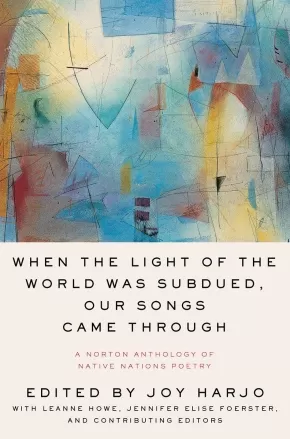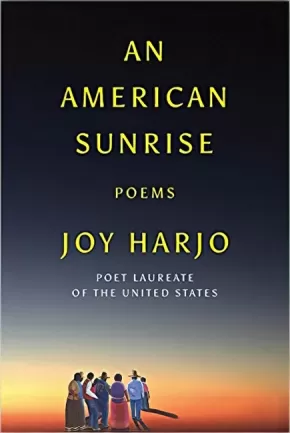Muscogee (Creek)
Synopsis:
“To know ourselves is the most profound and difficult endeavor. Though we are all made of the same questions, we have individual routes to the answers, or to reframing the questions. Why is there evil in the world? Why do people suffer, and some more than others? Why are we here? What are we doing here? What happens after death? Does anything mean anything at all? Who am I and what does it matter?” writes Joy Harjo, renowned poet and activist, in this profound work about the struggles, challenges, and joys of coming of age.
In her best-selling memoir Poet Warrior, Harjo led readers through her lifelong process of artistic evolution. In Girl Warrior, she speaks directly to Native girls and women, sharing stories about her own coming of age to bring renewed attention to the pivotal moments of becoming including forgiveness, failure, falling, rising up, and honoring our vast family of beings.
Informed by her own experiences and those of her ancestors, Harjo offers inspiration and insight for navigating the many challenges of maturation. She grapples with parents, friendships, love, and loss. She guides young readers toward painting, poetry, and music as powerful tools for developing their own ethical sensibility. As Harjo demonstrates, the act of making is an essential part of who we are, a means of inviting the past into the present and a critical tool young women can use to shape a more just future. Lyrical and compassionate, Harjo’s call for creativity and empathy is an urgent and necessary work.
Reviews
"Joy Harjo combines the wisdom that was here long before Europeans showed up with the challenges of a woman’s life in the present. The result is inspired by the past and a personal preparation for the future."— Gloria Steinem, feminist activist and author
"What a beautiful and brilliant call to arms. I wish I had Joy Harjo’s words when I was young. This book is a lovely ode to her own bravery and by extension, all of ours. Girl Warrior gives possibility to young people (and all people) through Joy Harjo’s own coming-of-age narrative. More than about having waded through tumultuous waters and survived to not only tell the story but thrive inside the people we become on the other side. This book is simply a balm."— Jacqueline Woodson, National Book Award winner
Additional Information
176 pages | 5.37" x 8.00" | Hardcover
Synopsis:
With more than fifty contributors, Indigenous Critical Reflections on Traditional Ecological Knowledge offers important perspectives by Indigenous Peoples on Traditional Ecological Knowledge and Indigenous value systems. The book aims to educate and inspire readers about the importance of decolonizing how Indigenous Knowledges are considered and used outside of Native communities.
By including the work of Indigenous storytellers, poets, and scholars from around the globe, editor Lara Jacobs and chapter authors effectively explore the Indigenous value systems—relationships, reciprocity, and responsibility—that are fundamental to Indigenous Knowledge systems and cultures. Indigenous languages and positionality statements are featured for each of the contributors to frame their cultural and geographical background and to allow each Indigenous voice to lead discussions and contribute critical discourse to the literature on Indigenous Knowledges and value systems. By creating space for each of these individual voices, this volume challenges colonial extraction norms and highlights the importance of decolonial methods in understanding and protecting Indigenous Knowledges.
Indigenous Critical Reflections on Traditional Ecological Knowledge is an essential resource for students, academics, members of Tribal, state, and federal governments, Indigenous communities, and non-Indigenous allies as well as a valuable addition to environmental and Indigenous studies collections.
Reviews
“Indigenous Peoples have shared values, but we live them out in ways that reflect the places where our Tribes emerged as People and the communities in which we live. Lara Jacobs has created a touchstone in these collected essays and reflections from Indigenous Peoples throughout the so-called Americas and beyond, giving voice to the various ways we live out relationships, reciprocity, and responsibility. I will return to these words again and again, and so will you.” —Patty Krawec, author of Becoming Kin: An Indigenous Call to Unforgetting the Past and Reimagining Our Future
Educator Information
Contributors include: Melinda M. Adams, Joe Anderson, Coral Avery, Andrew Kalani Carlson, Kathryn Champagne, Brandie Makeba Cross, Joanna M. DeMeyer, Jonathan James Fisk, Pat Gonzales-Rogers, Celina Gray, Rhode Grayson, Zena Greenawald, Jennifer Grenz, Joy Harjo, Mandi Harris, Jessica Hernandez, Victor Hernandez, David Iniguez, Michelle M. Jacob, Lara A. Jacobs, Lydia L. Jennings, Eileen Jimenez, Stephanie Kelley, David G. Lewis, Tomás A. Madrigal, Tara McAllister, Lauren Wendelle Yowelunh McLester-Davis, Angeles Mendoza, Kat Milligan-McClellan, Todd A. Mitchell swəlítub, Don Motanic, ‘Alohi Nakachi, Kaikea Nakachi, Kobe , Natachu, Ululani Kekahiliokalani Brigitte Russo Oana, Jennifer R. O’Neal, Lily Painter, Britt Postoak, Leasi Vanessa Lee Raymond, Anamaq Margaret H. C. Rudolf, Oral Saulters, Sam Schimmel, Paulette Steeves, Joni Tobacco, Angelo Villagomez, Vivi Vold, Margaret Palaghicon Von Rotz, Luhui Whitebear, Joseph Gazing Wolf, Monique Wynecoop, and Cherry YEW Yamane.
Additional Information
464 pages | 10.00" x 9.00" | 21 b&w photos, 6 charts, 7 tables | Paperback
Synopsis:
A Muscogee pop star and a cowboy who couldn’t be more different come together to strike a deal in this new romantic comedy by Danica Nava, USA Today bestselling author of The Truth According to Ember.
Pop singer Avery Fox has become a national joke after posing scantily clad on the cover of Rolling Stone in a feather warbonnet. What was meant to be a statement of her success as a Native American singer has turned her into a social pariah and dubbed her a fake. With threats coming from every direction and her career at a standstill, she escapes to her estranged grandmother Lottie’s ranch in Oklahoma. Living on the rez is new to Avery—not only does she have to work in the blazing summer heat to earn her keep, but the man who runs Lottie’s horse ranch despises her and wants her gone.
Red Fox Ranch has been home to Lucas Iron Eyes since he was sixteen years old. He has lived by three rules to keep himself out of trouble: 1) preserve the culture, 2) respect the horses, and 3) stick to himself. When he is tasked with picking up Lottie’s granddaughter at the bus station, the last person he expected to see is the Avery Fox. Lucas can’t stand what she represents, but when he’s forced to work with her on the ranch, he can’t get her out of his sight—or his head. He reminds himself to keep to his rules, especially after he finds out the ranch is under threat of being shut down.
It’s clear Avery doesn’t belong here, but they form a tentative truce and make a deal: Avery will help raise funds to save the ranch, and in exchange, Lucas will show her what it really means to be an Indian. It’s purely transactional, absolutely no horsing around…but where’s the fun in that?
Reviews
"Artfully crafted and bursting with tension, Avery and Lucas’ story hits every beat with intention and ease. Nava delivers a sharp, funny, and deliciously slow-burning romance about two people learning to carve out their own space in the world. Love is a War Song is the book of the summer!”—Lyla Sage, New York Times bestselling author of Swift and Saddled
“A swoony love story that deftly explores identity, redemption, and the complexities of cancel culture. Danica Nava's sophomore novel is as thought provoking as it is funny and heart melting. It's a must read for all romance book lovers.”—Hannah Grace, #1 New York Times bestselling author of Daydream
"I devoured this within hours. I absolutely loved every page and how Avery overcame her struggles. My kingdom for Lucas. He was the most swoony MMC. The ending was so emotional and I was holding back tears. Sweet and sexy in the perfect package."—Nisha J Tuli, international bestselling author of Trial of the Sun Queen and Not Safe for Work
"Hilarious, sexy, and oh so addictive, Love is a War Song delivers the country-pop star mashup romance readers have been desperately waiting for! Danica Nava’s razor sharp wit and gift for storytelling never fail to make me laugh and swoon. Thanks to Danica Nava, I’m officially in my cowboy romance reading era, and I never want to leave! Between the dreamy western backdrop and pitch perfect enemies to lovers banter, Love is a War Song is a must read for fans of genre staples like Lyla Sage and Rebekah Weatherspoon."—Ellie Palmer, author of Four Weekends and a Funeral
“Danica Nava’s Love is A War Song is an at times hilarious yet moving story of redemption, love, and the importance of family and community. Fish out of water is one of my favorite tropes to read, and Nava executed it perfectly. I can’t wait to read what she writes next!”—Kristina Forest, USA Today bestselling author of The Love Lyric
Additional Information
336 pages | 5.18" x 8.00" | Paperback
Synopsis:
A beautifully illustrated edition of Poet Laureate Joy Harjo’s poem “Washing My Mother’s Body,” which offers a way through grief when the loss appears unbearable.
As I wash my mother’s face, I tell her
how beautiful she is, how brave, how her beauty and bravery
live on in her grandchildren. Her face is relaxed, peaceful.
Her earth memory body has not left yet,
but when I see her the next day, embalmed and in the casket
in the funeral home, it will be gone.
Where does it go?
Through lyrical prose and evocative watercolor illustrations by award-winning Muscogee artist Dana Tiger, Washing My Mother’s Body explores the complexity of a daughter’s grief as she reflects on the joys and sorrows of her mother’s life. She lays her mother to rest in the landscape of her memory, honoring the hands that raised her, the body that protected her, and the legs that carried her mother through adversity.
Moving, comforting, and deeply emotional, Washing My Mother’s Body is a tender look at mother-daughter relationships, the complexity of grieving the loss of a parent, and the enduring love of those left behind.
Additional Information
80 pages | 5.79" x 7.81" | Hardcover
Synopsis:
A powerful work of reportage and American history that braids the story of the forced removal of Native Americans onto treaty lands in the nation’s earliest days, and a small-town murder in the ‘90s that led to a Supreme Court ruling reaffirming Native rights to that land over a century later.
Before 2020, American Indian reservations made up roughly 55 million acres of land in the United States. Nearly 200 million acres are reserved for National Forests—in the emergence of this great nation, our government set aside more land for trees than for Indigenous peoples. That changed on July 9, 2020, when a high-profile Supreme Court case—which originated with a small-town murder two decades earlier—affirmed the reservation of Muscogee Nation. The ruling resulted in the largest restoration of tribal land in U.S. history, merely because the Court chose to follow the law.
In the 1830s Muscogee people were rounded by the US military at gunpoint and forced into exile halfway across the continent. At the time, they were promised this new land would be theirs for as long as the grass grew and the waters ran. But that promise was not kept. When Oklahoma was create on top of their land, the new state claimed their reservation no longer existed. Over a century later, when a Muscogee citizen was sentenced to death for murdering another Muscogee citizen, his defense attorneys argued the murder occurred on the reservation of his tribe, and therefore Oklahoma didn’t have the jurisdiction to execute him. Oklahoma argued that reservation no longer existed. In the summer of 2020, the Supreme Court said: no more; a ruling that would ultimately underpin multiple reservations covering half the land in Oklahoma, including Nagle’s own Cherokee Nation.
Here Rebecca Nagle tells the story of the generations-long fight for tribal land and sovereignty in Eastern Oklahoma. By chronicling both the contemporary legal battle and historic acts of Indigenous resistance, By the Fire We Carry stands as a landmark work of American history. The story it tells exposes both the wrongs that our nation has committed in its long history of greed, corruption and lawlessness, and the Native battle for the right to be here that has shaped our country.
Educator Information
By the Fire We Carry is hard-hitting American history that expands on the nation's story. It tells of the treatment of Native Americans, their removal and displacement, and the genocide committed against them by the US government from their viewpoint.
Additional Information
352 pages | 6.00" x 9.00" | 23 b/w photographs and maps | Hardcover
Synopsis:
The gripping, forgotten tale of Ira Hayes—a Native American icon and World War II legend who famously helped raise the flag at Iwo Jima but spent the latter half of his life haunted by being a war hero.
IRA HAYES tells the story of Ira Hamilton Hayes from the perspective of a Native American combat veteran of the Vietnam generation. Hayes, along with five other Marines, was captured in Joe Rosenthal’s iconic photograph of raising the stars and stripes on Mount Suribachi during the battle for the Japanese Island of Iwo Jima. The photograph was the inspiration and model for the U.S. Marine Corps War Memorial in Arlington.
Between the time he helped raise that flag and his death—and beyond—he was the subject of more newspaper columns than any other Native person. He was hailed as a hero and maligned as a chronic alcoholic unable to take care of himself. IRA HAYES explores these fluctuating views of Ira Hayes. It reveals that they were primarily the product of American misconceptions about Native people, the nature of combat, and even alcoholism. Like most surviving veterans of combat, Ira did not think of himself as a heroic figure. There can be no doubt that Ira suffered from PTSD, which is a compound of survivor’s guilt, the shock of seeing death, especially of one’s friends, and the isolation brought on by feeling that no one could understand what he had been through. Ira’s life has been a subject of two motion pictures and a television drama. All these dramas sympathize with him, but ultimately fail to see his binge drinking as his way of temporarily escaping the melancholy, the rage he felt, his sense of betrayal, and the sheer boredom of peacetime.
IRA HAYES breaks apart the complexities of Ira’s short life in honor of all Native veterans who have been to war in the service of the United States. This is equally their story.
Reviews
"Written with page-turning excitement, Tom Holm, a Native scholar and veteran of Vietnam, offers an Indigenous realism through the heroic life of Ira Hayes, an Akimel O’odam marine in World War II. You will re-live the life of Ira Hayes who helped to raise the American flag at Iwo Jima after the bloodiest battle in Pacific during the war and became a legend. A gifted storyteller, Holm writes with an engaging insight making the reader feel right beside Ira Hayes in boarding school, combat, and struggling with PTSD."—Donald L. Fixico (Muscogee, Seminole, Shawnee and Sac and Fox), Regents’ and Distinguished Foundation Professor of History, Arizona State University
“WWII hero Ira Hayes would have appreciated this book. Author Tom Holm uses Ira’s courage and humility as tools to dissect the historic and current fate of his Native American people. And Ira’s challenges focus light upon the tragedy of war and the horrors of PTSD. A meaningful and beautifully-researched read.”—Judy Avila, bestselling author of Code Talker: The First and Only Memoir by One of the Original Navajo Code Talkers of WWII
“Tom Holm brilliantly and respectfully offers readers a rich and long overdue account of the life and tragic death of Ira Hayes that pierces through the stereotypes and misconceptions that plagued his during his life and long after his passing. It is a sensitive work that reminds us of the enormous emotional, psychological, and cultural difficulties Hayes had to cope with throughout his life. It is a splendid and timely contribution.” —Dr. David Wilkins, E. Claiborne Robins Distinguished Professor in Leadership Studies and citizen of the Lumbee Nation of North Carolina
“As a historian and a veteran, Tom Holm is uniquely positioned to write this important story, the first scholarly treatment of Hayes' life and times. Holm examines Hayes' struggles with fame and illness after World War II while offering insights into a post-war America hostile to Native identity and sovereignty despite the sacrifices made by Hayes and thousands of other Native Americans.”—Paul C. Rosier, Ph.D., Professor of History at Villanova University and author of Serving Their Country: American Indian Politics and Patriotism in the Twentieth Century
"An excellent piece of scholarship; the definitive work on this Native American veteran. Carefully nuanced and rich in context, Holm transcends and dispels the stereotypes of Ira Haye’s life to show the complexity of the Akimel O’odham experience, the impacts of World War II, the social use of alcohol in 1940s America, and his personal experiences from poverty, racism, and the unwanted and unending attention following the flag raising on Mount Suribachi. As Holm concludes, 'He should be remembered for who he was rather that for what the dominant society has been led to believe about him.'"—William C. Meadows, Missouri State University
"Tom Holm deservedly looms large in the history of Indigenous peoples’ military service in the wars of the twentieth century. In his new book, IRA HAYES, Holm reintroduces us to the iconic individual in ‘The Photograph’ of the flag-raising on Mount Suribachi. Holm extricates Hayes from the trope of tragedy and the racist stereotype of the ‘drunken Indian’ into which his story was confined during his lifetime and in which it remained trapped since his death. Instead, a complex Ira Hayes comes to life in the long context of his Akimel O’odham culture and community, American colonialism and racism, his military service, and his likely suffering from Post-Traumatic Stress Disorder. This tour de force is, by turns, compelling, devastating, and intensely humanizing."—R. Scott Sheffield, Professor of History at University of the Fraser Valley and co-author of Indigenous Peoples and the Second World War: The Politics, Experiences and Legacies of War in the US, Canada, Australia and New Zealand
“A strong contribution to the literature of World War II, Native American warriors, and the unseen wounds of war.”—Kirkus Reviews
Additional Information
320 pages | 6.35" x 9.25" | Hardcover
Synopsis:
Mother Earth is calling on us to act—the collective wisdom of thousands of years of Indigenous knowledge can guide us.
Indigenuity, or Indigenous ingenuity, stems from an ancient idea and practice that Native peoples have engaged in for millennia. It was born of a careful mindfulness and attentiveness to our planet and all of its creatures, and a recognition that human experience is intertwined with all that surrounds us. As a society, we rarely pay attention to our land, air, and water, exacting a high price for all life on this planet. On Indigenuity is a call for us to learn a key lesson: it’s time to apply ancient Indigenous wisdom to solve modern problems.
The author, leading Indigenous thinker Daniel Wildcat, discusses some of the most important Native knowledge that is the foundation of science, the environment, biology, and our culture, arguing that restoration through the practice of Indigenuity is essential if we are to make progress toward saving our home.
By surrounding ourselves with human creations, Wildcat contends that we have created an “insulated ignorance” for ourselves, and what we need to solve the problems of the twenty-first century is a different perspective. Drawing upon history, personal experiences, and extensive research, Wildcat invites readers on a profound journey of discovery, bridging the gap between how we’ve already tried to help our planet and the traditional Indigenous knowledge that could be the key to making a real difference.
Reviews
“Dan Wildcat’s evocative essay . . . On Indigenuity, is a compelling framework to rethink the role of the western worldview in shaping our physical and cultural landscapes. These critical reflections invite deep engagement with Indigenous ways of knowing and being, to heal land and our relationships to the living world. He helps us to remember ourselves as kinfolk, in service to mutual thriving of people and planet.”—Robin Wall Kimmerer, Author of Braiding Sweetgrass
“In On Indigenuity, Daniel Wildcat makes a passionate plea for a paradigm shift to viewing the world as full of relatives instead of resources. This eco-kinship vision of the world, rooted in Indigenous wisdom and ingenuity, provides us with a powerful approach to addressing the challenges of the Anthropocene. Given the climate crisis now upon us, this book is a must-read!”—Marika Holland, Senior Scientist, National Center for Atmospheric Research
"On Indigenuity is a value-based, ethical blueprint for partnering with ourselves and the planet to heal and protect, guiding us through the challenges of climate change toward regenerative living, a type of living our Indigenous relatives have known for hundreds of years.”—Jerry Floersch, Professor Emeritus, Rutgers University School of Social Work
“If you believe that, in order to confront the pending and growing global climate crisis, we need to do something differently, or even if you are merely open to that idea, you should read this book. Professor Wildcat draws from his lifetime of experience and exposure to many Indigenous cultures of this hemisphere, and many of the greatest Indigenous thinkers of our time, to carefully and clearly explain the only hopeful way out of our current predicament. Wildcat calls for Indigenuity, an application of thinking grounded in worldviews that see humankind as living in a world of relatives, in relationship, rather than full of resources to be consumed and exploited. We must abandon the anthropocentric worldview that has led to the Anthropocene era in which we have been living to correct the destructive ways that have led us to the current predicament. Indigenous worldviews, and their resulting approaches to living in the world, offer the only compelling path to continued human existence. For those who have worked to help protect and revitalize those traditional Indigenous cultures and worldviews, Dr. Wildcat’s message comes at a critical time, as we all face the consequences of the dominant settler-based worldview that has led us to this point. Now, increasing numbers of descendants of settlers are recognizing the importance of listening to and meaningfully collaborating with Indigenous peoples as they recover and breathe life into their own place-based cultures derived over millennia of experiential learning about how to live in collaboration with the rest of life in their locales. We are living in a time where we must make room for a new, old, way to come to the forefront of how we approach our position in this world.”—Brett Lee Shelton (Oceti Sakowin Oyate-Oglala Lakota), Senior Staff Attorney, Native American Rights Fund
Additional Information
144 pages | 5.00" x 8.00" | Paperback
Synopsis:
Explore Native American culture and learn Hand Talk, also known as Plains Indian Sign Language, Plains Sign Talk, and First Nation Sign Language.
In Talking with Hands, professional Native American dancer, storyteller, and educator Mike Pahsetopah reveals the beauty of Plains Indian Sign Language, which was once used as a common language between the Indigenous peoples of the region now generally known as the Great Plains of North America. The language was used for trade, but also for storytelling and by the Deaf community, making it a very common and useful tool in society. Today, only a few native speakers remain.
This beautifully designed book makes practicing Plains Indian Sign Language easy and engaging. Learn the proper positions and motions of this now-rare language with photos and descriptions throughout the pages. Follow along with diagrams to perfect your abilities.
Learn how to use your hands to convey the meanings of over 200 common words. In this detailed guide, you will learn to sign words like:
- Hungry
- Camp
- Evening
- Angry
- Fire
- Owl
- Together
- Brave
- And more
Honor and carry on the culture of the Plains peoples by learning the sign language they shared.
Additional Information
168 pages | 8.30" x 10.35" | 100+ color photos | Paperback
Synopsis:
Selected speeches from Indigenous leaders around the world--necessary wisdom for our times, nourishment for our collective, and a path away from extinction toward a sustainable, interconnected future.
Indigenous worldviews, and the knowledge they confer, are critical for human survival and the wellbeing of future generations. Editors Wahinkpe Topa (Four Arrows) and Darcia Narvaez present 28 powerful excerpted passages from Indigenous leaders, including Mourning Dove, Robin Wall Kimmerer, Winona LaDuke, and Xiuhtezcatl Martinez. Accompanied by the editors’ own analyses, each chapter reflects the wisdom of Indigenous worldview precepts like:
• Egalitarian rule versus hierarchical governance
• A fearless trust in the universe, instead of a fear-based culture
• The life-sustaining role of ceremony
• Emphasizing generosity and the greater good instead of pursuing selfish goals and for personal gain
• The laws of nature as the highest rules for living
The editors emphasize our deep need to move away from the dominant Western paradigm--one that dictates we live without strong social purpose, fails to honor the earth as sacred, leads with the head while ignoring the heart, and places individual “rights” over collective responsibility. Restoring the Kinship Worldview is rooted in an Indigenous vision and strong social purpose that sees all life forms as sacred and sentient--that honors the wisdom of the heart, and grants equal standing to rights and responsibilities.
Inviting readers into a world-sense that expands beyond perceiving and conceiving to experiencing and being, Restoring the Kinship Worldview is a salve for our times, a nourishment for our collective, and a holistic orientation that will lead us away from extinction toward an integrated, sustainable future.
Reviews
“Humans have a particular ecological niche, a role as the custodial species of this earth. We must return our species to this niche within the next decade, or perish. This book is a perfect place to start—the foundation is good relations, making kin both human and nonhuman—and here we have story from a gathering of some of the finest Indigenous thinkers on the planet. Four Arrows and Darcia Narvaez have a particular way of bringing the right people together for such purposes.” —TYSON YUNKAPORTA, author of Sand Talk, senior research fellow at Deacon University, woodcarver, and poet
“Mahalo Four Arrows and Darcia Narvaez for this collection, this eloquence and grace through time so we can recognize and honor the common sense and purpose of continuity. All of it is needed now. We are all meant to wake up together.” —MANULANI ALULI MEYER, director of Indigenous education, University of Hawai‘i–West O‘ahu
“Darcia Narvaez and Four Arrows have gathered an inspiring pastiche of wise Native American voices woven together by their own insightful and heartfelt dialogues to gift us with an invaluable bundle of tenets and templates for the urgent project of decolonizing and rewilding our minds and communities.” —BILL PLOTKIN, PhD, author of Soulcraft, Wild Mind, and The Journey of Soul Initiation
Additional Information
336 pages | 6.00" x 8.95" | Paperback
Synopsis:
A magnificent selection of fifty poems to celebrate three-term US Poet Laureate Joy Harjo’s fifty years as a poet.
Over a long, influential career in poetry, Joy Harjo has been praised for her “warm, oracular voice” (John Freeman, Boston Globe) that speaks “from a deep and timeless source of compassion for all” (Craig Morgan Teicher, NPR). Her poems are musical, intimate, political, and wise, intertwining ancestral memory and tribal histories with resilience and love.
In this gemlike volume, Harjo selects her best poems from across fifty years, beginning with her early discoveries of her own voice and ending with moving reflections on our contemporary moment. Generous notes on each poem offer insight into Harjo’s inimitable poetics as she takes inspiration from Navajo horse songs and jazz, reckons with home and loss, and listens to the natural messengers of the earth. As evidenced in this transcendent collection, Joy Harjo’s “poetry is light and elixir, the very best prescription for us in wounded times” (Sandra Cisneros, Millions).
Additional Information
144 pages | 5.65" x 8.53" | Hardcover
Synopsis:
We live in an astounding world of relations. We share these ties that bind with our fellow humans—and we share these relations with nonhuman beings as well. From the bacterium swimming in your belly to the trees exhaling the breath you breathe, this community of life is our kin—and, for many cultures around the world, being human is based upon this extended sense of kinship.
Kinship: Belonging in a World of Relations is a lively series that explores our deep interconnections with the living world. The five Kinship volumes—Planet, Place, Partners, Persons, Practice—offer essays, interviews, poetry, and stories of solidarity, highlighting the interdependence that exists between humans and nonhuman beings. More than 70 contributors—including Robin Wall Kimmerer, Richard Powers, David Abram, J. Drew Lanham, and Sharon Blackie—invite readers into cosmologies, narratives, and everyday interactions that embrace a more-than-human world as worthy of our response and responsibility.
With every breath, every sip of water, every meal, we are reminded that our lives are inseparable from the life of the world—and the cosmos—in ways both material and spiritual. “Planet,” Volume 1 of the Kinship series, focuses on our Earthen home and the cosmos within which our “pale blue dot” of a planet nestles. National poet laureate Joy Harjo opens up the volume asking us to “Remember the sky you were born under.” The essayists and poets that follow—such as geologist Marcia Bjornerud who takes readers on a Deep Time journey, geophilosopher David Abram who imagines the Earth’s breathing through animal migrations, and theoretical physicist Marcelo Gleiser who contemplates the relations between mystery and science—offer perspectives from around the world and from various cultures about what it means to be an Earthling, and all that we share in common with our planetary kin. “Remember,” Harjo implores, “all is in motion, is growing, is you.”
Proceeds from sales of Kinship benefit the nonprofit, non-partisan Center for Humans and Nature, which partners with some of the brightest minds to explore human responsibilities to each other and the more-than-human world. The Center brings together philosophers, ecologists, artists, political scientists, anthropologists, poets and economists, among others, to think creatively about a resilient future for the whole community of life.
Contributors are both Indigenous and non-Indigenous.
Additional Information
180 pages | 5.27" x 7.75" | Paperback
Synopsis:
Three-term poet laureate Joy Harjo offers a vivid, lyrical, and inspiring call for love and justice in this contemplation of her trailblazing life.
Joy Harjo, the first Native American to serve as U.S. poet laureate, invites us to travel along the heartaches, losses, and humble realizations of her "poet-warrior" road. A musical, kaleidoscopic, and wise follow-up to Crazy Brave, Poet Warrior reveals how Harjo came to write poetry of compassion and healing, poetry with the power to unearth the truth and demand justice.
Harjo listens to stories of ancestors and family, the poetry and music that she first encountered as a child, and the messengers of a changing earth—owls heralding grief, resilient desert plants, and a smooth green snake curled up in surprise. She celebrates the influences that shaped her poetry, among them Audre Lorde, N. Scott Momaday, Walt Whitman, Muscogee stomp dance call-and-response, Navajo horse songs, rain, and sunrise. In absorbing, incantatory prose, Harjo grieves at the loss of her mother, reckons with the theft of her ancestral homeland, and sheds light on the rituals that nourish her as an artist, mother, wife, and community member.
Moving fluidly between prose, song, and poetry, Harjo recounts a luminous journey of becoming, a spiritual map that will help us all find home. Poet Warrior sings with the jazz, blues, tenderness, and bravery that we know as distinctly Joy Harjo.
Additional Information
240 pages | 5.50" x 8.25" | 10 Photographs | Hardcover
Synopsis:
The Bear Is My Father is a celebration of the life, teachings, and legacy of Marcellus Bear Heart Williams. It follows the critically-acclaimed book, The Wind Is My Mother, which has been translated into 14 languages today. Globally renowned, Bear Heart was one of the last traditionally trained medicine persons of the Muscogee Creek Nation. Weaving together the knowledge of many traditions, Bear Heart was an ordained American Baptist Minister, Road Chief, and renowned spiritual counselor. Speaking in 13 Native American tribal languages, Bear Heart was considered a Multi-Tribal Spiritual Leader and was called upon internationally for his healing work. The Bear Is My Father contains the final words Bear Heart wrote before his "going on," with contributions from friends and family whose lives had been forever changed by his presence and work. It is co-authored by Reginah WaterSpirit, Bear Heart's Medicine Helper and wife of 23 years. When Reginah would ask Bear Heart exactly how he made his medicine, he always answered, “I don’t make the medicine, it was here before me. I’ve been entrusted to be a caretaker of certain sacred ways.”
Additional Information
176 pages | 5.50" x 8.50" | Paperback
Synopsis:
United States Poet Laureate Joy Harjo gathers the work of more than 160 poets, representing nearly 100 indigenous nations, into the first historically comprehensive Native poetry anthology.
This landmark anthology celebrates the indigenous peoples of North America, the first poets of this country, whose literary traditions stretch back centuries. Opening with a blessing from Pulitzer Prize–winner N. Scott Momaday, the book contains powerful introductions from contributing editors who represent the five geographically organized sections. Each section begins with a poem from traditional oral literatures and closes with emerging poets, ranging from Eleazar, a seventeenth-century Native student at Harvard, to Jake Skeets, a young Diné poet born in 1991, and including renowned writers such as Luci Tapahanso, Natalie Diaz, Layli Long Soldier, and Ray Young Bear. When the Light of the World Was Subdued, Our Songs Came Through offers the extraordinary sweep of Native literature, without which no study of American poetry is complete.
Reviews
This anthology is revelatory and stunning.… It shows the remarkable strength and diversity of Native poetry, which vitalizes all of American poetry. It is essential reading.—Arthur Sze, National Book Award–winning author of Sight Lines
Additional Information
352 pages | 6.14" x 9.29" | Paperback
Synopsis:
A stunning new volume from the first Native American Poet Laureate of the United States, informed by her tribal history and connection to the land.
In the early 1800s, the Mvskoke people were forcibly removed from their original lands east of the Mississippi to Indian Territory, which is now part of Oklahoma. Two hundred years later, Joy Harjo returns to her family’s lands and opens a dialogue with history. In An American Sunrise, Harjo finds blessings in the abundance of her homeland and confronts the site where her people, and other indigenous families, essentially disappeared. From her memory of her mother’s death, to her beginnings in the native rights movement, to the fresh road with her beloved, Harjo’s personal life intertwines with tribal histories to create a space for renewed beginnings. Her poems sing of beauty and survival, illuminating a spirituality that connects her to her ancestors and thrums with the quiet anger of living in the ruins of injustice. A descendent of storytellers and “one of our finest—and most complicated—poets” (Los Angeles Review of Books), Joy Harjo continues her legacy with this latest powerful collection.
Additional Information
144 pages | 5.50" x 8.25"

